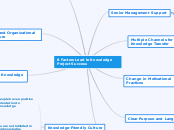8 Factors Lead to Knowledge Project Success
Senior Management Support
Types of helpful support
Send messages
Provide funding & resources
Clarify the types of knowledge
Multiple Channels for Knowledge Transfer
Beneficials
Add values
Enhance uses
Change in Motivational Practices
Change in motivational practices
Encourage effective behavior
Long-term add
General evaluation
Compensation structure
Short term incentives
Highly visible
Clear Purpose and Language
Clear purpose and terminology
Exclude other concepts
Clear language
Issue 1: complexity, uncertainty, and organic (new vocabulary)
Issue 2: conceptual and abstract vernacular
Link to Economic Performance or Industry Value
Benefit calculations
Cycle time
Customer satisfaction
Phone calls averted
KM: knowledge repository
Technical and Organizational Infrastructure
Technical infrastructure
Notes and Web
Common operating environment
Organizational infrastructure
Multiple levels of new roles
Serve as resources for individual projects
Standard, Flexible Knowledge Structure
Create some categories and key terms
Continual evolution and flexibility of a knowledge structure
Who controls decisions about the knowledge structure
Knowledge-Friendly Culture
People have a positive orientation to knowledge
Knowledge-oriented culture (Teltech)
People are not inhibited in sharing knowledge
Individual aspect inhibitions
Fearing layoffs
Job security
Firm aspect inhibitions
Pressure to be creative and original
a disinterest in sharing and using already created knowledge
“hero” mentality
respect only individual design achievements
The knowledge management projects fits with the existing culture
HP: The company’s culture of highly autonomous business units would not support a coordinated.
